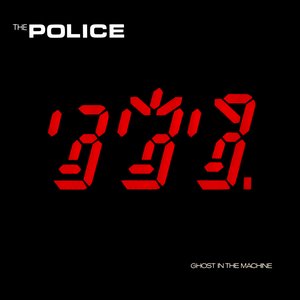


Ghost in the Machine is the fourth album by The Police, released in 1981. Much of the material in this album was inspired by Arthur Koestler's The Ghost in the Machine, which also donated the title. The cover art for Ghost in the Machine features an LED-inspired graphic that depicts the heads of the three band members each with a distinctive hair style (from left to right, Andy Summers, Sting with spiky hair, and Stewart Copeland with a fringe); the band was unable to decide on a photograph to use for the cover. The album's cover is ranked at number 45 on VH1's 50 Greatest Album Covers. The album was the first Police record to feature heavy use of keyboards and saxophones. "Spirits in the Material World" used a synthesizer to mask the song's reggae influence, and the middle twenty minutes of the record ("Hungry for You (J'aurais Toujours Faim de Toi)" through "One World (Not Three)") has a great deal of saxophone harmonies. The opening to "Secret Journey" is a guitar layered with effects pedals. As Andy Summers recollects: “ I have to say I was getting disappointed with the musical direction around the time of Ghost in the Machine. With the horns and synth coming in, the fantastic raw-trio feel—all the really creative and dynamic stuff—was being lost. We were ending up backing a singer doing his pop songs." ” The LP opens with "Spirits in the Material World," a dark pop song with keyboards dubbed over Summers' original guitar line. Following that is "Every Little Thing She Does Is Magic", which features piano and a strong Caribbean vibe. "Invisible Sun" refers to The Troubles in Northern Ireland. "Hungry For You (J'Aurais Toujours Faim de Toi)" is sung mostly in French. "Demolition Man," the band's longest song, almost six minutes in length, features a strong bass line and saxophone, and was written by Sting while staying at Peter O'Toole's Irish mansion. Grace Jones and Sting have both recorded solo versions of the song. Manfred Mann's Earth Band also recorded a version of the song — rearranged and with extensive use of synthesizers — in 1982 for their "Somewhere in Afrika" album. "Too Much Information," "Rehumanize Yourself," and "One World (Not Three)" all concern various political themes. "Rehumanize Yourself" also features the only expletive on a Police record: the word "cunts". The final three songs return to the darker sound which opens the album: "Ωmegaman" features lyrics dealing with personal pressure, "Secret Journey" is a moody song about inner strength and enlightenment, and "Darkness," the album's Stewart Copeland-penned closer, is a dark and hostile ballad about the pressures of life. "Ωmegaman" was initially chosen to be the first single before the album but Sting was against the idea. "Invisible Sun," released as a single instead, was a large success in the UK, making it to #2 even though the video was banned by the BBC for including footage referring to the conflict in Northern Ireland. Later, "Every Little Thing She Does is Magic" made it to #3 in the U.S. and #1 in Britain, and "Spirits in the Material World" made it to the U.S. Top 20. Arthur Koestler's reaction to the album is said to have been muted. He knew little about the burgeoning New Wave scene, and said in an interview with the Paris Review (compiled later on in Writers At Work vol. Seven): “ Look at this. Did you ever see a magazine called the New Musical Express? It turns out there is a pop group called The Police — I don't know why they are called that, presumably to distinguish them from the punks — and they've made an album of my essay The Ghost in the Machine. I didn't know anything about it until my clipping agency sent me a review of the record. ” In his younger days, Sting was an avid reader of Koestler. Another of The Police's albums Synchronicity was also inspired by Koestler's The Roots of Coincidence, which mentions Carl Jung's theory of synchronicity. In 2000 Q magazine placed Ghost in the Machine at number 76 in its list of the 100 Greatest British Albums Ever. In 2003, the album was ranked number 322 on Rolling Stone magazine's list of the 500 greatest albums of all time. User-contributed text is available under the Creative Commons By-SA License; additional terms may apply.